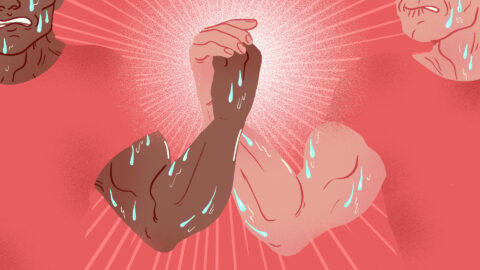Molly Manning Walker’s directorial debut examines consent and sexual pressure, following three teens on an end-of-exams trip. Review.

Content warning: This review discusses sexual assault.
Despite its searchable title, How to Have Sex is by no means a tutorial.
It’s more of an intentionally vague concept that pervades Molly Manning Walker’s directorial debut, indicative of a more sinister knowledge gap affecting young people today when it comes to sexual experiences — thanks, inadequate sex education and rampant online misinformation!
One of the most important films of the year, How to Have Sex examines British youth culture, consent, and sexual pressure through three teens on their end-of-exams trip to Crete, Greece. Tacky pool parties, a bucketload of crappy booze, and formative experiences await, some thrilling, some deeply traumatic. With powerful performances from a talented, emotionally generous young cast, superb cinematography from Manning Walker, and a script that actually sounds like teen conversation, How to Have Sex is a triumph of honest storytelling.
It’s by no means an easy watch, nor should it be. But it’s reality.
What is How to Have Sex about?
When you’re finished exams at the end of high school and you’re faced with impending results, the possibilities of the future, and the newfound independence that comes with graduation, what do you do? You grab your two best friends and head to Greece, geared up for a week of too many shots, too many spews, too many trays of cheesy chips, and doing it all again night after night. You’re set to make hilarious, gorgeous memories with your mates, and meet some new faces. And it’s going to be the “best holiday ever”.
Until it’s not.
This is the set-up for Manning Walker’s film, which sees 16-year-old Tara (Mia McKenna-Bruce), Em (Enva Lewis), and Skye (Lara Peake) heading to a week of partying in the coastal town of Malia for the British equivalent of America’s Spring Break or Australia’s Schoolies. The horizon is clear: drinking, dancing, and sex. For Tara, she’s yet to have her first sexual experience and she’s feeling under pressure to “catch up” with her friends. When Tara meets the neighbours, their week of partying intensifies and the pressure rises. However, for Tara, her first sexual experiences aren’t respectful, wanted, or consensual, and the film follows her during the week processing what’s happened as the party rages on.
How to Have Sex navigates consent and assault with respect and honesty
How to Have Sex isn’t the first teen film to examine these experiences of sexual assault and consent by any means, but Manning Walker brings a brutal honesty and frankness that sets the film apart. Through superb scripting and performances, the film acknowledges how male violence is normalised or brushed aside, how that “nightmare of a guy” in a social circle known for misconduct is simply allowed to carry on because “I’ve known him since we were little.” And in particular, the film puts emphasis on peer pressure to say nothing — and how blatantly society puts this responsibility on survivors.
You should have said something. These conversations aren’t plucked from obscurity, I’ve heard them myself. You might have heard them.
“You should have said something,” Tara is told. You should have said something. These conversations aren’t plucked from obscurity, I’ve heard them myself. You might have heard them. Manning Walker told the BFI that the idea for the film itself came from a similar trip in her own adolescence, but particularly from speaking to a group of friends years later about their collective experiences, and recognising yeah, that wasn’t OK. The film shows how casually teens can feel pressured into unwanted sexual experiences, even celebrated for doing so. And it’s this level of authenticity in the script that imbues How to Have Sex with uncomfortable accuracy, reminding us that not every teen sexual experience is as wacky as other films and TV shows present them.
Not everyone will feel this way. When I saw the film at the BFI, I was shocked to sit behind two people on the bus who loudly debated the incredulity of Tara’s circumstances, that her friends would never act as they do, that this kind of assault would never happen, and that Tara’s eventual courage to speak up about her experience felt removed from reality. I cannot disagree with these opinions more (and I tried my best to not scream these in public, I’ll tell you what). Toxic friendships that hasten sexual experiences and leave people in vulnerable scenarios exist. Everyday social circumstances that enable predatory behaviour exist.
Survivors of sexual assault do not always have the words to describe what has happened, nor should others blame them for processing it at their own pace. It’s a shocking reality that many who experience sexual assault may not feel able to label it as such, and misguided perceptions of rape keep this confusion in a deeply dangerous ‘grey area’.
“The way our culture talks about and defines rape can have significant impact on a person’s ability to recognise when it has happened to them,” Mashable’s Rachel Thompson writes in her book Rough. “The stigma attached to rape and cultural ideas about the consequences of accusing someone of sexual violence also present obstacles in acknowledging the reality of a violation.”
Toxic friendships that hasten sexual experiences and leave people in vulnerable scenarios exist. Everyday social circumstances that enable predatory behaviour exist.
Thompson points to shocking figures from the End Violence Against Women coalition, writing: “33 percent of people in Britain think it isn’t rape if a woman is pressure into having sex but there’s no physical violence. And one in ten people are ‘unsure or think it’s usually not rape to have sex with a woman who is asleep or too drunk to consent.'”
It’s this data and this reality that trickles into casual conversations and sexual experiences in How to Have Sex, how the characters talk about and pursue sex without speaking to consent or feelings of pressure in vulnerable circumstances.
How to Have Sex features an impeccable young cast
As the film’s protagonist, McKenna-Bruce takes Tara through a deeply compelling and devastating arc, beginning as a joyful, hilarious girl, the absolute life of the party, and finding herself crushed by her experiences of alienation, peer pressure, and ultimately, surviving assault. Through lengthy close ups that muddle the surrounding sounds, Manning Walker allows McKenna Bruce to move Tara through a mix of emotion — shock, shame, anger, disappointment, fear, suppressed vulnerability — as the party rages on around her. As much as she tries to plunge herself into every dance floor and pool party, Tara appears disconnected from everything: her social group, the ludicrous sexual stunts that define the Malia parties, and especially her own body.
Meanwhile, Tara’s two best friends prove polar opposites, with Peake perfecting peer pressure queen Skye and Lewis bringing sweet, hilarious nuance to Em, who actually recognises something is wrong with her friend. Both Skye and Em fail to adequately handle Tara’s experience, both painfully championing her in their own way instead of checking in properly with her. But what Manning Walker does with the core three is distill an absolute lack of knowledge each of them has about sex, consent, and pressure. They literally do not have the language to talk about their experiences beyond verbal high-fives, and because of this, Tara’s pain goes unacknowledged by her friends until the very last moments.
The film proves the best part of any party is before it’s started
If there’s a dominant truth in How to Have Sex it’s that the best part of the party is in the promise of it all. When Tara, Skye, and Em arrive in Malia, they’re giggling, bickering, screaming, and splashing about in the freezing ocean, on top of the world. They’re enamoured with their tiny hotel room, praising “the best view I’ve ever seen in my life”.
Though Manning Walker knows how to shoot the hell out of a party scene, it’s these early moments that I clung to for the rest of the film, the trio embracing their independence with hands in the air, deep-and-meaningfuls in the street while stuffing their faces with chips, and stocking up on supplies in the supermarket with their hard-saved cash. It’s pure, adolescent bliss, on the cusp of adulthood, and it’s truly fun to watch the chemistry of the core cast, imbuing Tara, Em, and Skye with sheer resilience, taking another shot right after a cheeky spew. They’re ridiculous, silly, and hilarious, and completely avoiding thinking about the future.
It’s this joy and silliness they deserve, but the formative experiences ahead of them will determine the rest of their lives. When the credits rolled of How to Have Sex in my screening, the cinema filled with the enormous, emotive sounds of “Strong” by Fred again… and Romy. I couldn’t move. It was perfect. “You don’t have to be so strong,” Romy sings. And she’s right. But we are.
If you have experienced sexual abuse, call the free, confidential National Sexual Assault hotline at 1-800-656-HOPE (4673), or access the 24-7 help online by visiting online.rainn.org.













